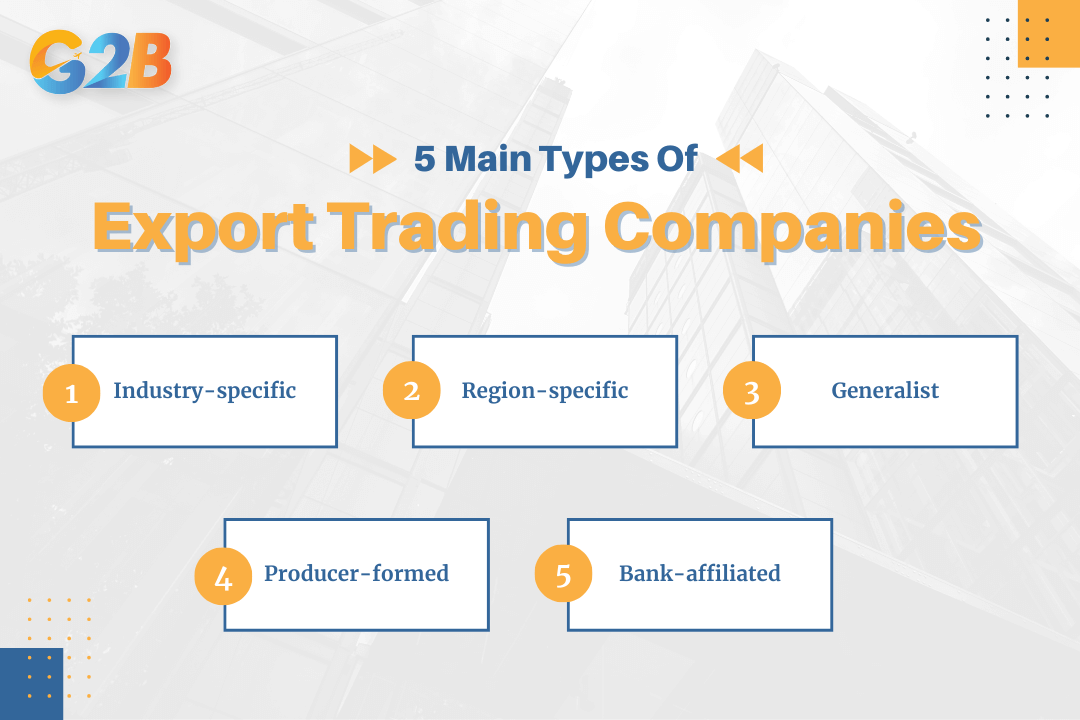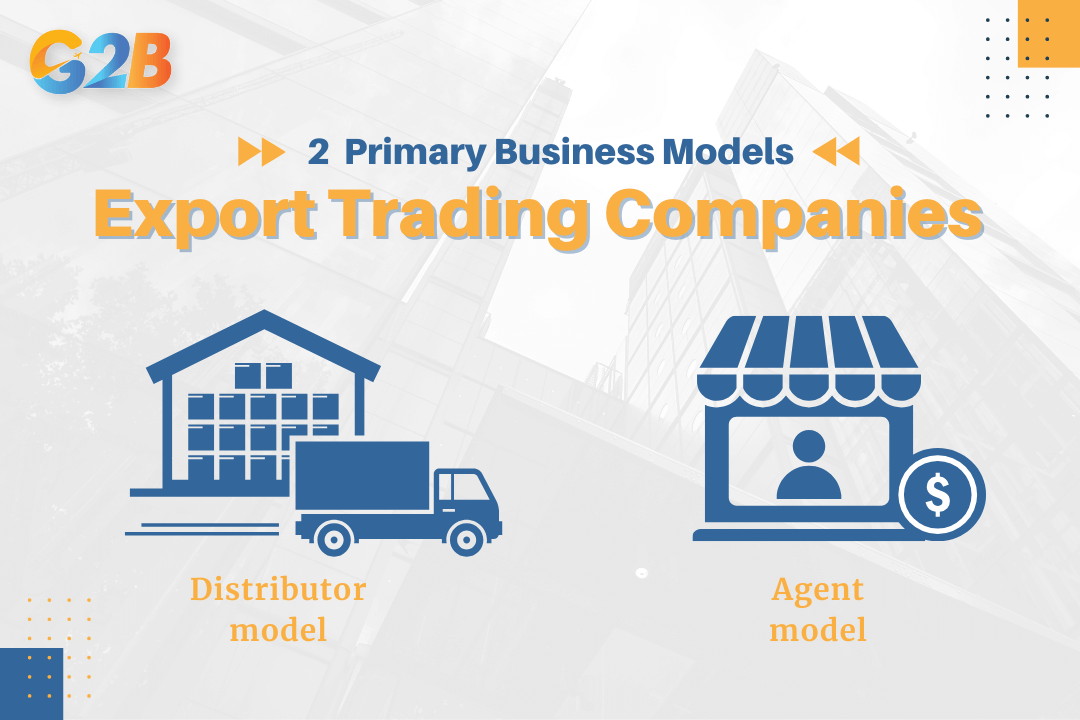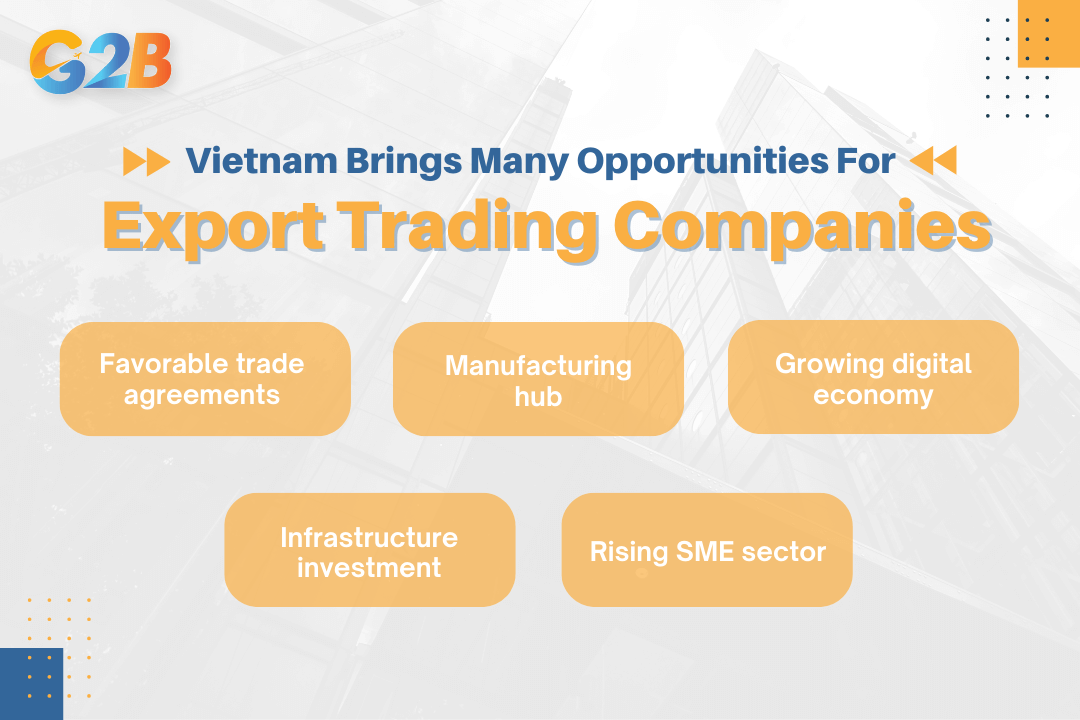An Export Trading Company (ETC) serves as a critical intermediary for businesses seeking to expand their reach into international markets. An ETC becomes a powerful ally, offering a suite of specialized services designed to streamline the entire export process from start to finish. Let’s define what an export trading company is, explore its various types and core functions, explain its operational models, and detail the immense benefits of partnering with one to unlock global growth.
What is an export trading company (ETC)?
An export trading company is an independent firm or a division of a larger company that facilitates exports for other companies by providing a comprehensive range of support services. Its primary function is to act as a bridge, connecting domestic producers with foreign buyers and sometimes purchasing goods from producers to resell internationally, managing the intricate journey of goods across international borders. An ETC handles the critical operational aspects of exporting, including logistics, shipping, coordinating insurance services, and billing, while also navigating the maze of legal and regulatory requirements to ensure full compliance.
By shouldering these responsibilities, an ETC enables manufacturers to focus on their core competencies - production and innovation - without building an in-house export department from scratch. This role was formally recognized and encouraged by legislation like the Export Trading Company Act of 1982 in the United States, which was designed to boost U.S. exports by making it easier for businesses to collaborate and access export trade services. This law primarily applies within the U.S. and has served as a model for export facilitation in other countries.
Types of export trading companies
Export trading companies can be structured in several ways, each tailored to meet different market needs and business strategies. Understanding these variations helps businesses identify the most suitable partner for their specific export goals.

There are five main types of ETCs
- Industry-specific: These ETCs concentrate on a particular sector, such as agriculture, electronics, or textiles. Their deep industry knowledge and extensive networks within the sector allow them to provide highly specialized expertise regarding product standards, market trends, and key distribution channels in that specific field.
- Region-specific: Focusing on a particular country or geographical region, these companies possess unparalleled local knowledge. They are experts in the target market's culture, business practices, regulations, and consumer behavior, as well as specific trade policies and tariff structures, making them ideal partners for businesses aiming to penetrate a specific international market.
- Generalist: These firms offer their services across a wide array of industries and regions. Their broad approach is suitable for companies with diverse product lines or those exploring multiple international markets simultaneously, often with a global or multi-market presence.
- Producer-formed: In this model, a group of producers or manufacturers collaborates to form their own ETC. This allows them to pool their resources, share the costs and risks of exporting, and maintain greater control over how their products are marketed and distributed internationally, thereby strengthening their collective bargaining power and export capabilities.
- Bank-affiliated: Permitted under legislation like the Export Trading Company Act of 1982, these ETCs are owned or invested in by banking organizations. They can offer significant advantages in trade finance, providing access to capital, letters of credit, and other financial instruments essential for managing the complexities of international transactions, but their activities may be subject to regulatory limitations depending on jurisdiction.
Roles of an export trading company (ETC)
An ETC plays several vital roles that collectively simplify and de-risk the process of international expansion for its clients. These functions are designed to address the primary challenges that businesses, particularly SMEs, face when venturing into foreign markets. The five principal roles are:
- Market intermediary: At its core, an ETC connects domestic sellers with foreign buyers. It leverages its established networks and market intelligence to identify opportunities and facilitate transactions that might otherwise be inaccessible to the manufacturer.
- Export facilitator: The ETC acts as the operational arm for a company's export activities. It manages the entire process, from handling initial inquiries and negotiating contracts to arranging transportation and ensuring timely delivery of goods, including preparing and managing export documentation and ensuring compliance with export regulations and customs procedures.
- Risk mitigator: International trade is fraught with risks, including currency fluctuations, payment defaults, and political instability. An ETC helps mitigate these dangers by managing trade finance, securing credit insurance, and navigating complex international payment systems, as well as coordinating with insurance providers to cover transport and operational risks.
- Market expander: For businesses looking to grow, an ETC is a strategic partner for market diversification. By identifying and vetting new overseas markets, an ETC enables companies to expand their customer base and reduce dependency on their domestic market, often providing market research and tailored entry strategies.
- Logistics coordinator: The physical movement of goods is one of the most complex aspects of exporting. An ETC coordinates all logistical elements, including warehousing, freight forwarding, customs clearance, and last-mile delivery, to ensure a seamless supply chain.
How an ETC works
An export trading company typically operates under one of two primary business models, which define its relationship with the manufacturer and its role in the sales process. The key difference lies in who holds ownership of the goods during the transaction.
- The most common model is when the ETC acts as a distributor. In this capacity, the ETC purchases the goods directly from the domestic manufacturer, taking legal title to them. It then assumes all the risks and responsibilities of reselling those products in the foreign market at a markup, including managing export logistics and compliance with export regulations. This model is straightforward for the manufacturer, as they are essentially making a domestic sale. Once the ETC buys the product, the manufacturer receives payment and is free from the complexities of international shipping, customs, and currency exchange. The ETC profits from the margin it creates by selling the goods at a higher price than it paid, and may aggregate products from multiple manufacturers to better serve foreign buyers.
- Alternatively, an ETC can operate as an agent. In this model, the ETC does not take ownership of the goods. Instead, it acts as a foreign sales representative for the manufacturer, working to find buyers and facilitate transactions on a commission basis. The manufacturer retains title to the goods until they are sold to the final foreign customer. While this approach gives the manufacturer more control over pricing and branding, it also means they retain more of the risk associated with the export sale. The ETC’s income is derived from a pre-agreed commission or fee for the services it provides in securing the sale, and usually maintains a close, ongoing relationship with the manufacturer but has limited control over final sales terms.

An export trading company typically operates under one of two primary business models
Core services offered by an ETC
Export trading companies provide a comprehensive menu of services that covers every stage of the export journey. By outsourcing these functions, businesses can access specialized expertise without the overhead of an in-house team.
Market research and analysis
Before entering a new market, thorough research is crucial. ETCs conduct detailed market analysis to identify viable opportunities, evaluate competition, understand consumer behavior, and assess regulatory landscapes. They also analyze market risks and provide strategic market entry recommendations. This intelligence allows businesses to make informed decisions and develop a targeted market entry strategy, ensuring that their products are well-positioned for success.
Marketing and promotion in foreign markets
Adapting marketing strategies for different cultures and languages is essential. ETCs handle international marketing and promotion, creating campaigns that resonate with local audiences. This can include translating marketing materials, managing digital advertising, representing the client at international trade shows, and leveraging their local media contacts to build brand awareness effectively. They also develop and manage distribution networks and sales channels to maximize market penetration.
Logistics and shipping coordination
Managing the physical flow of goods is a core function of an ETC. ETCs coordinate the entire supply chain, including transportation, warehousing, customs clearance, and insurance. They leverage their relationships with freight forwarders and shipping lines to negotiate favorable rates and ensure that goods are delivered efficiently and on schedule.
Export documentation and compliance
Navigating the paperwork of international trade can be overwhelming. ETCs manage all necessary export documentation, such as commercial invoices, packing lists, bills of lading, and certificates of origin. They ensure that all shipments comply with the customs regulations of both the exporting and importing countries, preventing costly delays and penalties. Additionally, ETCs assist in handling export licenses, permits, and special regulatory approvals required for certain products or industries.
Financing and credit risk management
Securing payment and managing financial risk are critical concerns in exporting. ETCs often assist with trade finance solutions, such as arranging letters of credit or securing credit insurance, to guarantee payment from foreign buyers. They can also advise on currency hedging strategies to protect against losses from unfavorable exchange rate fluctuations. ETCs may further negotiate payment terms and manage credit risk analysis to safeguard exporters' interests.
After-sales support
Providing support after the sale is key to building long-term customer relationships. ETCs can facilitate after-sales service, coordinating with local partners to handle customer inquiries, warranty claims, and technical support. This ensures a positive customer experience and helps build a strong brand reputation in the new market.
Opportunities for ETC and exporters in Vietnam
Vietnam's dynamic and rapidly growing economy presents significant opportunities for both exporters and the ETCs that support them. With a strategic location, a young and skilled workforce, and a government committed to global integration, the country has become a key player in international trade.
- Favorable trade agreements: Vietnam's participation in major free trade agreements (FTAs), such as the EU-Vietnam Free Trade Agreement (EVFTA) and the Regional Comprehensive Economic Partnership (RCEP), has drastically reduced tariffs and opened up access to massive consumer markets. This makes Vietnamese goods more competitive globally.
- Manufacturing hub: As global supply chains continue to diversify, Vietnam has emerged as a leading manufacturing hub in Southeast Asia, including rapid development in high-tech and value-added industries. This creates a high demand for ETCs that can connect Vietnamese producers in key sectors, such as electronics, textiles, agriculture, furniture, and seafood, with buyers worldwide.
- Growing digital economy: The rapid digital transformation across Vietnam is creating opportunities for tech-focused exports and e-commerce. ETCs that specialize in technology and digital services can help Vietnamese firms tap into the booming global demand for innovative solutions, supported by government initiatives promoting cross-border e-commerce platforms and digitalization for exporters.
- Infrastructure investment: Significant government investment in infrastructure, including ports, highways, and logistics centers, is making it easier and more efficient to move goods. This improves the operational capabilities of ETCs and reduces supply chain costs for exporters, especially through upgrading smart ports and advanced logistics technologies.
- Rising SME sector: Vietnam's burgeoning small and medium-sized enterprise (SME) sector is a primary market for ETCs. These firms often have high-quality products but lack the resources to export independently, making them ideal clients for the comprehensive services an ETC provides.

Vietnam brings many opportunities for ETC and exporters
With Vietnam’s growing consumer base and its expanding network of free trade agreements, there are significant opportunities for ETCs and exporters to access new markets and increase their global competitiveness. To fully leverage these opportunities and establish a strong presence, many investors need a trusted and effective company formation service in Vietnam, which simplifies legal procedures and ensures compliance with local regulations.
Challenges of ETC in the Vietnamese market
Despite the numerous opportunities, operating as an ETC in Vietnam is not without its challenges. Navigating the local business environment requires a deep understanding of its unique complexities.
- Regulatory complexity: While improving, Vietnam's regulatory and administrative systems can still be complex and opaque, with overlapping jurisdiction between agencies and unclear regulations posing compliance challenges. ETCs must stay constantly updated on changing laws, customs procedures, and licensing requirements to avoid compliance issues.
- Intense competition: The success of Vietnam's export economy has attracted intense competition, both from local and foreign ETCs. Additionally, competition comes from direct exporters and cross-border e-commerce platforms. To succeed, companies must differentiate themselves by offering specialized expertise, superior service, or innovative solutions.
- Logistical bottlenecks: Although infrastructure is improving, logistical challenges such as port congestion and transportation inefficiencies can still cause delays, particularly outside of major economic hubs. Further challenges include limited domestic logistics capacity, high inland transport costs, and weather-related risks affecting delivery reliability. Effective supply chain management is critical to overcoming these hurdles.
- Access to finance: For both ETCs and the SMEs they serve, accessing adequate trade finance can be a challenge. Limited access to capital can constrain growth and the ability to take on larger export orders. The availability of suitable financial products remains limited, and complex loan approval processes add further barriers.
- Quality control and standards: Ensuring that products consistently meet the stringent quality standards of international markets like the EU and the US is a constant challenge. ETCs must work closely with producers to implement rigorous quality control processes, upgrade production capabilities, achieve necessary certifications, and comply with increasingly strict international regulations.
Benefits of using an ETC
Partnering with an export trading company offers a multitude of strategic advantages, particularly for small and medium-sized enterprises looking to compete on a global scale. These benefits directly address the primary barriers to entering foreign markets.
- Expertise and network: ETCs provide immediate access to specialized knowledge of international markets, regulations, and logistics. Their established networks of foreign buyers, distributors, and government contacts can take years for an individual company to build on its own. They also facilitate access to professional distribution channels and support international brand development.
- Cost-effectiveness: Building an in-house export department requires a significant investment in specialized staff, training, and resources. Using an ETC is often more cost-effective, as it allows businesses to leverage a shared team of experts without the associated overhead costs. ETCs also help reduce financial and procedural risks associated with exporting.
- Reduced risk: ETCs help mitigate the financial and operational risks of exporting. They manage compliance, secure payments, and handle logistical complexities, allowing businesses to expand internationally with greater confidence and security.
- Market diversification: By identifying and providing access to new international markets, ETCs enable companies to diversify their revenue streams. This reduces dependence on a single domestic market and makes the business more resilient to economic fluctuations.
ETC vs. Export management company (EMC)
While the terms are sometimes used interchangeably, there are fundamental differences between an Export Trading Company (ETC) and an Export Management Company (EMC). An EMC acts more like an outsourced export department for a manufacturer, whereas an ETC often acts as an independent buyer and reseller.
| Feature | Export trading company (ETC) | Export management company (EMC) |
|---|---|---|
| Primary function | Often buys goods from a domestic firm and resells them in foreign markets. The focus is on the transaction and movement of goods. | Acts as the export department for a manufacturer, focusing on marketing strategy, brand building, and long-term market development. |
| Ownership of goods | Frequently takes title to the goods, assuming the risks of ownership and collection. | Rarely takes title to the goods. It operates as an agent on a commission or fee basis, with the manufacturer retaining ownership. |
| Business relationship | Typically a client-based relationship focused on facilitating multiple export transactions. It serves many different companies. | A closer, more integrated partnership. An EMC often represents the manufacturer exclusively in specific markets under the manufacturer's name. |
| Scope of services | Heavily focused on logistics, trade finance, and documentation to facilitate the buying and selling process. | Offers a broader range of strategic services, including marketing, channel management, and customer support, in addition to logistics. |
An export trading company is a strategic partner that empowers businesses to navigate the complexities of global commerce. For SMEs in dynamic markets like Vietnam, an ETC can be the catalyst for unlocking international growth, providing the expertise, network, and operational support needed to compete effectively on the world stage. By handling everything from logistics and compliance to marketing and finance, an ETC allows businesses to focus on what they do best - creating great products.


 Delaware (USA)
Delaware (USA)  Vietnam
Vietnam  Singapore
Singapore  Hong Kong
Hong Kong  United Kingdom
United Kingdom 
